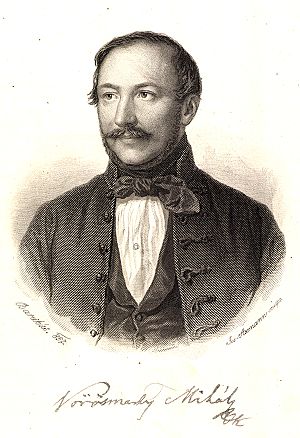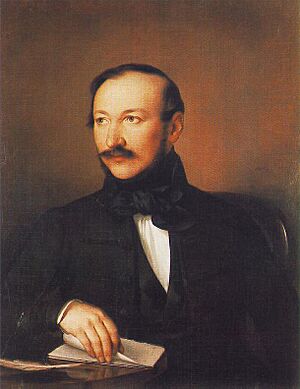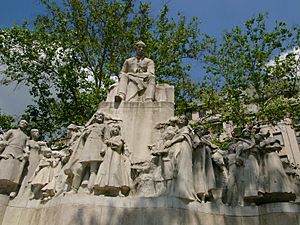Mihály Vörösmarty facts for kids
Quick facts for kids
Mihály Vörösmarty
|
|
|---|---|
 |
|
| Born | 1 December 1800 Puszta-Nyék, Hapsburg Monarchy |
| Died | 19 November 1855 (aged 54) Pest, Austrian Empire |
| Spouse | Laura Csajághy |
| Children | Béla Ilona Erzsébet |
Mihály Vörösmarty was a very important Hungarian poet and playwright. He lived from December 1, 1800, to November 19, 1855. He is known for his strong love for his country and his beautiful poems and plays.
Contents
About Mihály Vörösmarty
Mihály Vörösmarty was born in Puszta-Nyék, Hungary. His family was noble, but they became poor after his father died in 1817. Mihály worked as a tutor to pay for his studies in Pest. He studied with the Cistercians and Piarists.
In 1825, the Hungarian Diet (a type of parliament) met. This made Vörösmarty feel very patriotic. He started writing poetry that showed his love for Hungary. He also fell in love with Etelka Perczel, but she was from a much richer family. Many of his poems are about this love that was not returned.
His patriotism also showed in his epic poem, Zalán futása (The Flight of Zalán), written in 1824. This long poem was about Hungarian history. It also talked about important political ideas of his time. This poem helped start a new style of writing called Romanticism in Hungary. Other writers like Károly Kisfaludy saw him as a leader of this new style.
Vörösmarty decided to focus on writing instead of law. This made his money problems worse. Between 1823 and 1831, he wrote four plays and eight shorter epic poems. Some were about history, and some were imaginative stories.
His Work and Recognition
In 1830, the Hungarian Academy of Sciences was created. Vörösmarty became a member of the language section. Later, he became its director and received a yearly payment. He also helped start the Kisfaludy Society, a group for writers. In 1837, he started two magazines: the Athenaeum for literature and the Figyelmező for reviews.
From 1830 to 1843, Vörösmarty mostly wrote plays. One of his most famous plays is Csongor és Tünde (Csongor and Tünde), written in 1830. This play was inspired by an old Hungarian tale and by William Shakespeare's A Midsummer Night's Dream. Another play, Vérnász (Blood Wedding, 1833), won an award from the Academy.
He also published many books of poetry. His song "Szózat" ("Appeal", 1836) became a very important national song, like a second national anthem for Hungary. In 1843, he married Laura Csajághy. This marriage inspired him to write many new love poems. They had five children together. In 1848, he worked with other famous poets, János Arany and Sándor Petőfi, to translate William Shakespeare's plays.
Later Life and Legacy
Vörösmarty was elected to the Hungarian Diet in 1848. He also became a high court judge in 1849. However, the Hungarian Revolution of 1848-49 failed. This was a very sad time for him and for Hungary. He had to live in exile for a short time. When he returned to Hungary in 1850, his health was already getting worse.
In 1854, he wrote his last poem, "A vén cigány" ("The Old Gypsy"). He moved back to Pest to be near doctors. He died there on November 19, 1855. His funeral on November 21 was a day of national mourning in Hungary. His children were left without money. But a national collection was organized by Ferenc Deák to help them.
Honors
- A large monument to Mihály Vörösmarty stands in Budapest. It is in the square named after him, Vörösmarty tér.
- Hungary issued a stamp with his portrait on May 5, 1937.
- Another stamp was issued by Hungary on July 28, 1955, as part of a series about famous poets.
Images for kids
See also
 In Spanish: Mihály Vörösmarty para niños
In Spanish: Mihály Vörösmarty para niños
 | Claudette Colvin |
 | Myrlie Evers-Williams |
 | Alberta Odell Jones |




